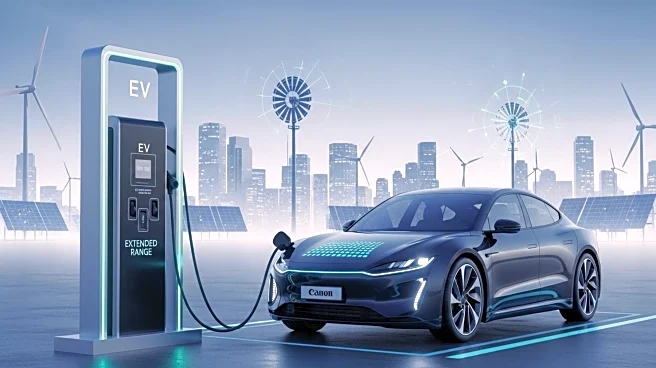What's Happening?
German Chancellor Friederich Merz is set to propose a loophole at the upcoming EU summit that would allow the sale of 'extended range' electric vehicles (EREVs) beyond the 2035 phase-out of combustion engine cars. These vehicles, while marketed as electric, can emit as much carbon dioxide as petrol SUVs when not charged, according to analysis by the green group Transport & Environment (T&E). EREVs operate by using a battery to power the wheels, with an engine or plug charging the battery. When the battery is depleted, they consume an average of 6.7 liters of petrol per 100 kilometers, similar to plug-in hybrids and some petrol SUVs. The technology is currently dominated by Chinese manufacturers, with limited European expertise in the field.
Why It's Important?
The proposal by Chancellor Merz highlights a significant debate within the EU regarding the future of automotive emissions and the role of hybrid technologies. Allowing EREVs could undermine the EU's goal to eliminate new combustion engine car sales by 2035, potentially delaying the transition to fully electric vehicles. This move could also strengthen China's position in the European automotive market, as they currently lead in EREV technology. European automakers may face increased competition and pressure to adapt to these changes, impacting the region's automotive industry and its environmental policies.
What's Next?
Chancellor Merz's proposal is likely to spark discussions among EU leaders about the balance between technological neutrality and environmental commitments. The outcome of these discussions could influence future EU regulations on vehicle emissions and the automotive market. Stakeholders, including environmental groups and European car manufacturers, are expected to weigh in on the potential implications of allowing EREVs and plug-in hybrids post-2035.
Beyond the Headlines
The push for EREVs raises questions about the EU's commitment to reducing carbon emissions and the potential for regulatory loopholes to hinder progress. It also underscores the geopolitical dynamics of the automotive industry, with China poised to capitalize on any shifts in EU policy. The debate may also influence consumer perceptions and demand for hybrid versus fully electric vehicles in the coming years.










